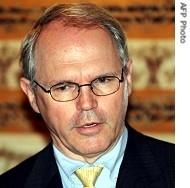Washington
10 September 2009
 |
| Christopher Hill (file photo) |
Hill said recent bomb attacks in Iraq are an effort to undermine the Iraqi people as U.S. forces gradually withdraw under a timetable established by President Barack Obama.
"The violence represents an effort to undermine Iraqi authorities, to undermine them at a time when it is widely understood that U.S. forces are beginning a departure. I think what is important is that the Iraqi authorities and the Iraqi people have understood that they cannot let them [the insurgents] to get away with this," he said.
President Obama has ordered all U.S. combat forces out of Iraq by August of next year. And all U.S. forces, including support troops, are to be out by the end of 2011 under a separate agreement that was reached between the Iraqi government and the Bush administration.
But lawmakers as well as American military commanders are concerned by violence in Iraq, particularly about the possibility that tensions between Arabs and Kurds could expand into widespread violence.
Howard Berman is Chairman of the House Foreign Affairs Committee. "What are the prospects that there will be a serious outbreak of hostilities between Arabs and Kurds? Are growing Arab-Kurdish tensions the biggest threat to Iraqi stability?," he said.
Ambassador Hill said the U.S. commander in Iraq, General Ray Odierno, is working with the Baghdad government and the Kurdish regional government on steps to maintain stability in the north.
The U.S. military has offered to set up a joint patrol system involving Iraqi government troops, Kurdish forces and U.S. troops. Discussions on the plan are continuing.
Ambassador Hill said Iran and Iraq share cultural, religious and commercial relationships. But he warned that Iran continues to have a "very malevolent relationship" with Iraq, including meddling in internal Iraqi politics and supplying weapons to insurgents.
"We see continued signs of Iranian weaponry finding their way there. There is no question that Iran and Iraq should have a longstanding relationship, they are after all neighbors. But I think Iran needs to do a much better job of respecting Iraq's sovereignty and they should start by ceasing to provide weaponry to various extremist groups in Iraq," he said.
Looking ahead to parliamentary elections in Iraq in January, Georgia Democrat David Scott and Ambassador Hill had this exchange about the question of a possible referendum on the U.S. military presence in Iraq.
SCOTT: "Do you foresee any circumstances in which the Iraqi government will ask the U.S. and ask the president of the U.S. to review his scheduled deployment of troops out of Iraq?"
HILL: "I do not."
SCOTT: "Do you see that there may be a problem with Prime Minister [Nouri al-] Maliki putting on the ballot in the upcoming elections a referendum on that precise question?"
HILL: "I think a referendum would be more possible if there were a perception that we were not living up to the security agreement. We are living up to the security agreement."
In his testimony on Thursday, Ambassador Hill also responded to complaints from lawmakers that they have not heard sufficient expressions of appreciation from Iraqi leaders and officials for the sacrifice American troops have made in Iraq.
Hill, who also appeared Thursday before the Senate Foreign Relations Committee, said he hears from Iraqis every day who appreciate these sacrifices.